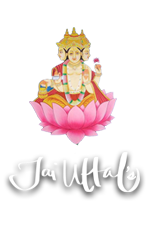Jai Uttal has done it again! Though “Shiva Station” has long been among my favorite Kirtan/Devotional CDs — and I doubted that he could ever surpass it — “Queen of Hearts,” a masterful, visionary work that shows both musical maturity and spiritual depth, vibrates constantly in my home (and my heart). Touted as “a unique blend of reggae, ska, and samba rhythms, ” which it definitely is, I also feel shades of Jimi Hendrix, elements of jazz-fusion, and glimpses of Ali Akbar Khan.
Jai Uttal, unlike many other recording artists producing kirtan CDs in the modern Yoga community, has a certain musicality that comes through in his work. Virtuoso musicianship — both his and that of his other well-chosen associates — is evident throughout, on every song. Moreover, his music has a certain funkiness borne of passion (rajas), as opposed to the more self-consciously solemn, mellow and goodie-goodie (sattva) sensibility found on so many other kirtan CDs today. The result is a distinct liveliness, a vibrancy, that grabs you and virtually transports you to that sublime world known as Vaikuntha, where dynamic spirituality reigns supreme, and, more, to Vrindavan, where every word is a song and every step is a dance.
This lively, transcendent passion is evident from the very first track of the new CD, which begins with an ode to Lord Krishna, the bonzer blue flautist of bhakti — that is to say, the Original Personality of Godhead.
Right from the get-go, Jai glorifies Him with pronounced intensity and deliberateness, bringing to mind the Bauls he so admires. This opening song, called “Thief of Hearts,” consists of a litany of Krishna’s names, effectively evoking that beautiful rascal divinity who will, indeed, steal your heart — if you let Him. “Thief of Hearts” is inextricably related to “Queen of Hearts,” the title track, which is about Sri Radha, Krishna’s entirely lovable consort and the main protagonist on this CD.
It is after this — on the second track, “Ocean of Milk” — that Jimi’s spirit emerges in full force, with guitar tones reminiscent of “Axis: Bold as Love.” Jai here gives us another helping of Krishna’s names, this time associating Him with Narayana (Vishnu). In Epic and Puranic circles, this association with the four-armed form of the Divine serves to highlight Krishna’s transcendental status — He is not just a darling cowherd boy but God Himself, the Soul of souls, our source, our essence, our Heart of hearts.
Jai then takes us to “Lanka Burning,” celebrating Krishna in the form of Rama, the spiritual archer — “Sita-Rama, Sita Rama, Sita Rama.” What more needs to be said? Sita, the Divine Moiety of Rama, the counterpart, the better half — She is to Him what Radha is to Krishna. Two sides of the Supreme. The complete whole — male and female absolute, lovingly acknowledged in all their fullness. No sexism here!
“Queen of Hearts” is next, sauntering in rather inconspicuously. But it soon explodes with Jai’s vivacious, dynamic, and electrifying mood, his signature style, bringing us head-on into glorification of Sri Radha and Her relationship with Krishna. Radhe Radhe bolo Radhe, Shyam Shyam Shyam Shyam — “Chant the names of Radha and Krishna [Shyam]!!” All with delicious blues-inflected harp — an eloquent touch.
Time to mellow out: “Hari’s Rapture” has elements of smooth jazz, with beautiful nylon-string guitar and mellisonant flute. Jose Neto’s sensitive guitar solo perfectly complements the mood of this piece, as does Manose Singh’s gentle flute work. “Radha-ramana Haribol” The song asks us to chant the names of Radha-ramana, bringing to mind, for those who know the inner meaning, the Deities of Vrindavan (Vraja). “Jai Radhe.” With this tune, praise of Srimati Radharani is never far from one’s mind and heart.
“Govinda Jaya Jaya,” the next piece, carries on with exaltation of Radha-ramana, the Deities of Vraja. “Radha-ramana” literally refers to the “lover of Radha,” who is obviously Krishna. Jai conveys this with emotion and sensitivity; he takes a traditional tune and makes it his own, with his characteristic devotion and feeling.
The rhapsodic truth of Sri Radha would be incomplete without the Maha-mantra, and so Jai chants: Hare Krishna, Hare Krishna, Krishna Krishna, Hare Hare/ Hare Rama, Hare Rama, Rama Rama, Hare Hare, meaning, “O Lord, O Divine Energy of the Lord! Please engage me in Your service.” More literally, the mantra is in the vocative, beseeching Sri Radha for divine love, a selfless prayer to the Feminine Divine, asking for nothing more than to live a life of devotion. The mantra asks — almost demands — that She show special mercy, that She engage us in Krishna’s service. This is the seventh song on Jai’s CD, and he aptly calls it “Last Breath,” which is enticing: May we all have this mantra on our lips as we breathe our last.
As a postscript, the CD ends with “Om Namo Bhagavate Vasudevaya,” a beautiful arrangement of a traditional tune. The meaning of this mantra is, basically, “Prostration, obeisance, to Bhagavan Vasudeva [Krishna].” Jai combines this with the Maha-mantra in a particularly creative way, showing his depth as a true artist, completing the CD with angelic singing and moody spirituality. As I play the disk yet again, I marvel at his singing. That voice. What can I say? Jai’s voice is a gift from above. Nuff said.
_
Steven J. Rosen (Satyaraja Dasa) is an initiated disciple of His Divine Grace A. C. Bhaktivedanta Swami Prabhupada. He is also founding editor of the Journal of Vaishnava Studies and associate editor of Back to Godhead magazine. In addition, he has published twenty-one books in numerous languages, including Krishna’s Song: A New Look at the Bhagavad Gita (Praeger, 2007); Essential Hinduism (Rowman & Littlefield, 2008); and The Yoga of Kirtan: Conversations on the Sacred Art of Chanting (FOLK Books, 2008).

